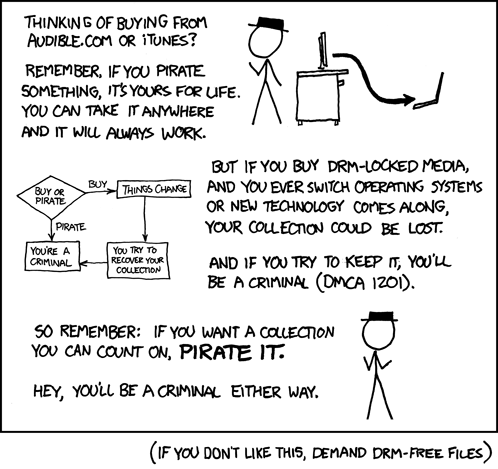Perhaps the most important of these limitations is the analog hole. This phenomenon means that any media file, regardless of its type, must be preserved completely intact within an encryption. For practical purposes, this means that any software DRM protection is inherently vulnerable to circumvention. And thanks to numerous other vulnerabilities inherent to DRM systems, it's quite common for DRM on video games to be cracked the very day the game is released.
What does this mean for us? A number of things. First, it has ushered in the passage of particularly harsh anti-circumvention legislation. It is currently illegal in most cases for you to circumvent a DRM protection, even if your reproduction of the file would otherwise be legal. Randall Munroe, the author of xkcd, puts it quite eloquently:
In other words, it would be illegal (under DMCA 1201) to "try to keep" music that you purchased legitimately because you would be cracking DRM protections. This glaring legislative oversight aside, the comic also brings up another interesting point: that DRM makes a product less appealing.
Consider the plight of a gamer who wants to play Assassin's Creed II. Because of the flaws inherent to all DRM systems, there are unrestricted, free copies of the game readily available. If the consumer was to purchase a legitimate copy of the game, it would be laden with DRM. Never mind the $60 difference in price (which is by no means negligible); the requirement that players maintain a constant online connection in order to play the game has rendered the legitimate copy objectively inferior to the pirated version, which has no such limitation. Which way do the incentives point?
This brings us about to my last point about DRM: that it creates far more problems for legitimate users than it does for pirates. As I stated above, pirates are capable of circumventing even the most advanced protections available. In a very real sense, people who choose to purchase a legitimate copy of Assassin's Creed II are being punished for crimes they did not commit. All the while, pirates everywhere are enjoying a superior version of the game.
 |
| To be honest, this isn't much of an exaggeration |

